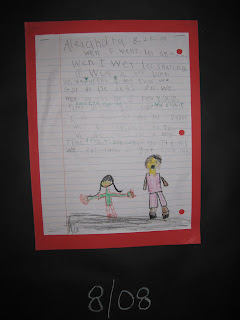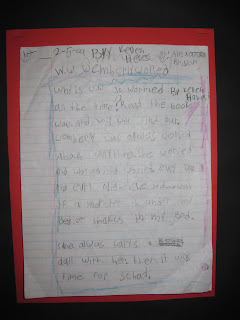 Tonight I had the honor of attending our county's celebration of second language learners. To my thrill one of the general education students in my first grade classroom was honored as the "Chets Creek Second Language Learner of the Year." She is Armenian and I remember so well her journey into our school. Actually, who could forget! She entered shyly almost hidden behind her mother's dress. I don't know who looked more frightened, our little kindergartner or her mom! I think we peeled her off her mom that first day and for many days after that. She was terrified. When I would sit with the class at lunchtime, I would often find her in tears. She would be worried about a host of things, but most often that her mom would not be there at the end of the day. Those were such tearful times and there were mornings when I wondered if we would ever have a day without tears. I can only imagine her fears as she walked into that classroom each day understanding so little of the language and what was going on. I think of how brave her mom was to leave her. She too understood little of our language and customs and yet, she somehow found the courage to trust.
Tonight I had the honor of attending our county's celebration of second language learners. To my thrill one of the general education students in my first grade classroom was honored as the "Chets Creek Second Language Learner of the Year." She is Armenian and I remember so well her journey into our school. Actually, who could forget! She entered shyly almost hidden behind her mother's dress. I don't know who looked more frightened, our little kindergartner or her mom! I think we peeled her off her mom that first day and for many days after that. She was terrified. When I would sit with the class at lunchtime, I would often find her in tears. She would be worried about a host of things, but most often that her mom would not be there at the end of the day. Those were such tearful times and there were mornings when I wondered if we would ever have a day without tears. I can only imagine her fears as she walked into that classroom each day understanding so little of the language and what was going on. I think of how brave her mom was to leave her. She too understood little of our language and customs and yet, she somehow found the courage to trust.
It's hard to reconcile those images with the happy, outgoing little first grader I see today. When I sit with her today at lunch she chatters endlessly (I barely get a word in!) She chatters about her family and her friends. She is a great little reader and has assimilated into our class culture in a way that is very Americanized.
She is only one of the 262 students we have this year at Chets Creek who entered with families that speak a second language and qualify for some level of second language support. That is about 18% of our total population. We support families who speak 21 different languages! We are so very fortunate to have an assistant assigned to our school who works with our students and who understands both the student and family needs. My student is only one of the many success stories that we see every day. We are fortunate to have this type of diversity in our school. In my own classroom, my own mini-United Nations, we have students whose parents are first generation from the Sudan, Mexico, Korea, and Poland in addition to Armenia.
In fact we have a kindergarten bulletin board up in the building right now that demonstrates a young student's growth over time in both English and Japanese. While reading a book that was written in both English and Japanese to their class, kindergarten teachers Debbie Cothern and Michelle Ellis realized that one of their students could not only read the English version, but actually read the Japanese version of the book as well!

 As they investigated further, the student explained that she is learning to read and write in both languages. Their board shows her growth over time first in Japanese and then in English!
As they investigated further, the student explained that she is learning to read and write in both languages. Their board shows her growth over time first in Japanese and then in English!




 Parker begins first grade full of things he wants to write about. He uses some sight words and uses invented spelling for words that he doesn't know by sight. His work is easy to read because he has made the letter sound connection and easily hears sounds in words. He opens the piece establishing the context and then writes three pages describing a series of events. His ending provides closure for the piece. Parker also demonstrates
Parker begins first grade full of things he wants to write about. He uses some sight words and uses invented spelling for words that he doesn't know by sight. His work is easy to read because he has made the letter sound connection and easily hears sounds in words. He opens the piece establishing the context and then writes three pages describing a series of events. His ending provides closure for the piece. Parker also demonstrates 
 By mid-year Parker has written many engaging pieces. The piece above is an example of a nonfiction work where he writes all about computers including instructions for getting on the computer. He obviously knows lots about technology. He uses a series of questions to drive the piece. Parker demonstrates that he knows lots about nonfiction writing and includes many nonfiction conventions. His language conventions and spelling have greatly improved but it is his writing fluency that demonstrates the most obvious progress.
By mid-year Parker has written many engaging pieces. The piece above is an example of a nonfiction work where he writes all about computers including instructions for getting on the computer. He obviously knows lots about technology. He uses a series of questions to drive the piece. Parker demonstrates that he knows lots about nonfiction writing and includes many nonfiction conventions. His language conventions and spelling have greatly improved but it is his writing fluency that demonstrates the most obvious progress.




 The first piece written in early first grade is a small moment, "When I Went Ice Skating." The author writes a series of mini-events and shows that she has learned to edit her own work (using a green pencil).
The first piece written in early first grade is a small moment, "When I Went Ice Skating." The author writes a series of mini-events and shows that she has learned to edit her own work (using a green pencil). 
 In October the student completed a Question/ Answer pattern book, "Swimming Fun," that introduced a unit on nonfiction writing.
In October the student completed a Question/ Answer pattern book, "Swimming Fun," that introduced a unit on nonfiction writing.
 The December piece is a report about the student's family. It includes a Table of Contents, comparison, a "how to"/ procedural piece and a narrative about a vacation. The piece shows that the student has been exposed to and has internalized the nonfiction conventions.
The December piece is a report about the student's family. It includes a Table of Contents, comparison, a "how to"/ procedural piece and a narrative about a vacation. The piece shows that the student has been exposed to and has internalized the nonfiction conventions.


 The final piece is a letter written during our persuasive writing unit. This young writer wrote to the
The final piece is a letter written during our persuasive writing unit. This young writer wrote to the 
 It is always amazing at the progress that children make from the day they enter kindergarten until they end first grade. This bulletin board certainly displays that well and shows a young writer that is well on her way!
It is always amazing at the progress that children make from the day they enter kindergarten until they end first grade. This bulletin board certainly displays that well and shows a young writer that is well on her way!







 3-26-09
3-26-09 March 26, 09
March 26, 09 4-14-09
4-14-09 3-26-09
3-26-09 Beaches are better than pools because you can play in the sand. You can go in the water. You can bury yourself in the sand. You can lay in the sun. You can eat and drink at the beach. You can build a sand castle and you can find seashells. When you are done at the beach, if you are covered in sand, you can go to the beach's showers. Then you can dry off and go home very happy.
Beaches are better than pools because you can play in the sand. You can go in the water. You can bury yourself in the sand. You can lay in the sun. You can eat and drink at the beach. You can build a sand castle and you can find seashells. When you are done at the beach, if you are covered in sand, you can go to the beach's showers. Then you can dry off and go home very happy. 




